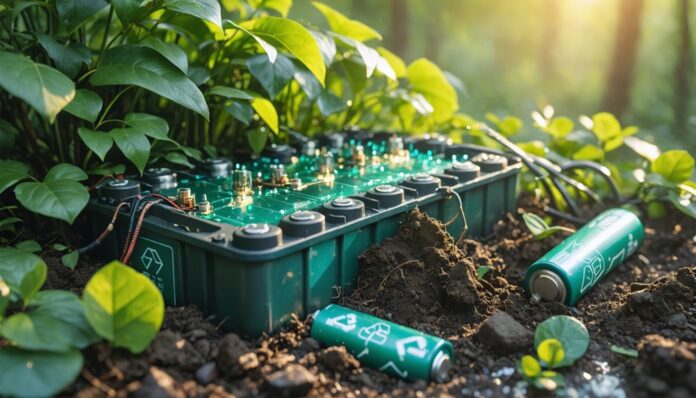Battery recycling is essential for the EV industry due to sustainable resource management and reduced reliance on virgin materials. As global electric vehicle production ramps up, effective recycling practices help meet regulatory demands and enhance supply chain efficiency. Innovative technologies improve recovery rates and material traceability, while government policies support industry growth. The shift to a circular economy in battery usage is vital. Further perspectives reveal the intricacies and future implications surrounding this critical aspect of the EV ecosystem, giving a deeper understanding into the challenges and future outlook of this significant area.
Highlights
- Battery recycling conserves valuable resources, reducing the reliance on virgin materials needed for new EV battery production.
- Efficient recycling methods can recover up to 90% of essential metals, minimizing environmental impact and waste.
- Stringent regulatory frameworks, like the EU Battery Law, enforce recycling standards essential for sustainable EV industry practices.
- Increasing EV sales will escalate battery recycling demands, making efficient systems critical to accommodate future growth effectively.
- Innovations in recycling technologies enhance material recovery efficiency, supporting the transition to a circular economy in the automotive sector.
The Growing Market for Battery Recycling
As the demand for electric vehicles (EVs) surges, the battery recycling market is undergoing an extraordinary evolution, positioned for substantial growth in the coming years. Current market trends indicate a striking trajectory, with projections estimating the market will scale from $4.9 billion in 2025 to an impressive $42.8 billion by 2034, reflecting a robust compound annual growth rate (CAGR) of 27.3%. The industry outlook remains positive as innovations in hydrometallurgical processes and direct recycling methods lower costs and enhance efficiency. Furthermore, as raw material prices rise, recycling is becoming increasingly competitive. In the Asia-Pacific region, where over 50% of market share resides, dynamic initiatives are set to bolster sustainability and operational self-sufficiency, signaling a transformative shift vital for the EV sector’s future. Governments implementing stricter recycling policies further underscore the critical need for effective battery management solutions. With the global EV battery recycling market expected to reach USD 23.72 billion by 2035, this growth reflects the increasing importance of sustainable practices in the industry. Additionally, the market is driven by the increasing demand for electric vehicles due to rising environmental concerns and favorable government initiatives.
Government Policies Driving Change
Government policies are increasingly instrumental in shaping the scenery of battery recycling within the electric vehicle (EV) industry. Recent policy changes, such as the Inflation Reduction Act’s Clean Vehicle Credit, create economic incentives for manufacturers to prioritize recycling capabilities. Grants, like those for battery recycling research and development, strengthen innovative approaches to enhance reuse efficiency. Additionally, regulatory frameworks from the EPA aim to standardize best practices, encouraging safe battery disposal and management. The Bipartisan Infrastructure Law allocates significant funding to help improve battery collection and recycling, which supports these initiatives. Furthermore, the US aims to achieve net-zero greenhouse gas emissions by 2050, highlighting the importance of sustainable practices in the EV sector. Investments in recycling workforce development initiatives guarantee a skilled labor force, ready to tackle the intricacies of recycling. Overall, these policies promote a collaborative environment, driving sustainable practices and reducing reliance on foreign materials, ultimately reinforcing the EV industry’s commitment to environmental responsibility.
Innovations in Recycling Technologies
The evolution of battery recycling within the EV industry is substantially influenced by pioneering innovations in recycling technologies. Advancements such as AI-driven sorting systems and debond-on-demand technology contribute to efficient cell recycling, enabling precise material extraction while minimizing contamination risks. The development of direct cathode-to-cathode recycling methods allows for high-performance recovered materials, reducing energy consumption compared to traditional techniques. Additionally, the emergence of decentralized recycling infrastructures establishes regional processing facilities that enhance supply chain efficiency. Complemented by blockchain-enabled material traceability, these innovations assure ethically sourced materials and quality compliance. Consequently, these advancements not only reinforce the sustainability of the EV industry but also promote a collective responsibility towards a more circular economy. ReCell Center’s efforts are essential in driving innovative recycling technologies to optimize lithium-ion battery recycling processes. Moreover, with electric vehicles contributing to a cleaner environment as their adoption increases, enhancing recycling processes is becoming more critical to support sustainable transportation solutions. Furthermore, the recycling of EV batteries helps prevent toxic materials from leaking into landfills, thereby reducing serious environmental hazards.
Sustainable Material Recovery Practices
While the urgency for sustainable practices in the EV industry intensifies, the focus on material recovery has gained prominence as a critical component of the recycling process. Advanced techniques such as hydrometallurgy and direct cathode recycling provide exceptional material efficiency, allowing for the recovery of up to 90% of essential metals and nearly 100% of cathode materials. These methods substantially contribute to waste reduction by minimizing chemical byproducts and enhancing energy efficiency. Moreover, the potential integration of closed-loop systems could revolutionize recycling, enabling full material reuse within existing supply chains. As the demand for lithium and other resources escalates, sustainable material recovery practices become paramount, promoting environmental resilience while supporting the burgeoning EV industry. Additionally, lithium-ion battery recycling methods helps address emerging issues associated with the clean energy transition. In this context, successful recycling relies on high recovery rates and effective recycling policies that support automakers in designing batteries for easier recycling.
Regional Developments in Recycling Infrastructure
Amidst the rapidly changing scenery of the electric vehicle (EV) industry, regional developments in recycling infrastructure play a crucial role in addressing sustainability challenges. In North America, significant investments and federal policies are establishing robust regional frameworks aimed at enhancing lithium-ion recycling capacity, with companies like Cirba Solutions expanding facilities to meet growing demands. Furthermore, as the demand for electric vehicles continues to grow, the recycling infrastructure must evolve to accommodate this increase. Additionally, recycling EV batteries is essential for resource conservation and can help reduce the need for virgin materials during this evolution. Given that battery recycling is a critical area for ongoing investment and development, it highlights the importance of elevating these regional infrastructures.
Meanwhile, the European Union enforces stringent recycling standards through the EU Battery Law, mandating high recovery rates for critical materials. This regulatory environment fosters innovations, particularly in hydrometallurgical methods, crucial for efficient recycling. Moreover, collaborations, such as Electra Battery Materials partnering with indigenous groups, highlight the importance of community involvement in these regional endeavors, reinforcing a sense of shared responsibility and commitment to sustainability across the EV landscape.
Challenges Facing Battery Recycling
Despite the increasing urgency for sustainable practices in the electric vehicle (EV) sector, battery recycling faces an array of significant challenges. Complex battery designs and varied chemistries, coupled with a lack of standardized recycling processes, complicate material recovery efforts. The extraction of materials like lithium, cobalt, and nickel can impact ecosystems and water supplies, further emphasizing the need for higher recycling rates. Safety risks during disassembly and high operational costs create additional obstacles. Economically, fluctuating recycled material prices and insufficient regional processing capacity deter investment in recycling infrastructure. Regulatory gaps, including inconsistent mandates and undefined producer responsibilities, further hinder progress. Finally, fragmented industry collaboration and low adoption of closed-loop principles prevent widespread effective recycling. Addressing these recycling challenges is critical, as they directly impact the environmental sustainability of the EV industry and efforts to reduce its overall ecological footprint. Additionally, the presence of high-voltage lithium-ion batteries poses a significant risk during the disassembly process, further complicating recycling efforts. Notably, EV battery recycling rates will increase as the electric vehicle industry grows, emphasizing the importance of overcoming these challenges.
The Future Outlook for the EV Industry
The future outlook for the electric vehicle (EV) industry indicates a path of significant growth and change, driven by market demands, technological advancements, and regulatory pressures. Market trends suggest that global EV stock could reach 525 million vehicles by 2035, with over 50% of new car sales expected to be electric. Industry perspectives highlight the shift towards emerging markets, coupled with stringent emissions mandates that will amplify recycling needs. However, challenges remain, including supply chain intricacies and the risk of overcapacity in battery production. Cumulative global public charging connectors are increasing rapidly, illustrating the growing infrastructure that will support EV adoption. Successfully traversing these dynamics will require innovative recycling strategies, particularly as countries aim to meet net-zero targets by 2050, ensuring that the EV industry grows sustainably while promoting a circular economy for battery materials. This initiative will be further accelerated by the fact that global electric fleet had almost 58 million cars at the end of 2024, illustrating the increasing reliance on electric vehicles. Moreover, the transition to EVs will likely lead to a reduction in greenhouse gas emissions, underscoring the importance of recycling in supporting overall sustainability goals.
Conclusion
To summarize, battery recycling emerges as an essential component of the burgeoning electric vehicle industry, driven by escalating market demand and supportive government policies. Innovations in recycling technologies and sustainable material recovery practices are addressing critical environmental challenges while enhancing resource efficiency. However, regional disparities in recycling infrastructure and operational obstacles remain significant roadblocks. The industry’s future hinges on overcoming these challenges, positioning battery recycling as a key pillar in ensuring the sustainability and growth of electric vehicles.
References
- https://www.globenewswire.com/news-release/2025/06/24/3104012/0/en/EV-Battery-Recycling-Outlook-Report-2025-2034-Stringent-Recycling-Mandates-Advances-in-Technologies-Partnerships-and-Regional-Facilities-Catalyzing-Sustainable-Growth.html
- https://www.knowledge-sourcing.com/report/ev-battery-recycling-market
- https://www.precedenceresearch.com/electric-vehicle-battery-recycling-market
- https://www.bccresearch.com/pressroom/fcb/global-ev-battery-reuse-and-recycling-market
- https://www.here.com/learn/blog/electric-vehicle-battery-recycling
- https://www.marketsandmarkets.com/Market-Reports/electric-vehicles-battery-recycling-market-187105929.html
- https://www.grandviewresearch.com/industry-analysis/ev-battery-recycling-market-report
- https://www.imarcgroup.com/electric-vehicle-battery-recycling-market
- https://www.epa.gov/electronics-batteries-management/battery-collection-best-practices-and-battery-labeling-guidelines
- https://www.energypolicy.columbia.edu/publications/strengthening-the-us-ev-battery-recycling-industry-to-onshore-critical-material-supply/





